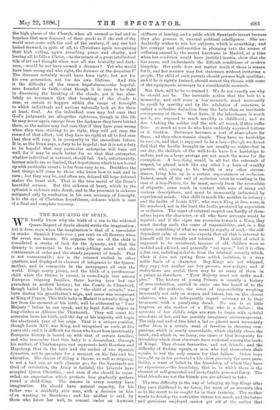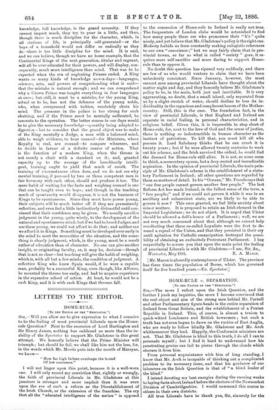THE BABY-KING OF SPAIN.
WE hardly know why the birth of a son to the widowed Queen-Regent of Spain should strike the imagination ; but it does, even when the imagination is that of a speculator in stocks. Spanish Funds rose per cent. on all Bourses when the event was known. We suppose the sex of the child is considered a stroke of luck for the dynasty, and that the dynasty is connected in the stock-jobbing mind with the continuance of order and the steady payment of bonds. That is not unreasonable ; nor is the interest excited in other quarters, and displayed in showers of telegrams to the Queen. mother, and in comments in the newspapers all over the world. Kings marry young, and the birth of a posthumous child when the throne is vacant, is exceedingly rare among European reigning families, there having been but one precedent in modern history ; for the Comte de Chambord, though bailed by his followers as "the child of miracle," was born during his grandfather's reign, and never was recognised as King of France. This little baby in Madrid is actually King by law from the moment of his birth, will be addressed as "Your Majesty" before he can speak, and by legal fiction reigns in long-clothes as Alfonso the Thirteenth. They will count his accession from his birth, and the day of his majority will begin the nineteenth year of his reign. That is a unique position, though Louis XIV. was King, and recognised as (inch, at five years old ; and it is difficult for those who know how inextricably European history is bound up with that of certain families, and who remember that this baby is a descendant, through his mother, of Charlemagne, and represents both Bourbon and Hapsburg, that is, the later and the earlier of two Spanish dynasties, not to speculate for a moment on his fate and his education. His chance of filling a throne, as well as reigning, is not a bad one, as such chances go ; for the Spaniards are tired of revolution, the Army is faithful, the Liberals have accepted Queen Christina,—and even if she should be super- seded, an expectation which protects him gradually gathers round a child-King. The masses in every country have imagination. He should have natural capacity, for his father was a decidedly able man, with a decision in him often wanting to Bourbons ; and• his mother is said, by those who know her well, to conceal under an Austrian
stiffness of bearing, and a pride which Spaniards resent because they also possess it, unusual political intelligence. She un- doubtedly wishes to win her subjects, which is something; and her courage and self-sacrifice in plunging into the scenes of suffering caused by the recent hurricane in Madrid, at a time when her condition would have justified inertia, show that she has nerve, and understands the difficult conditions of modern kingship. Her pride does not matter much if there is reason. for it, and her manner may fret statesmen without irritating a people. The child of such parents should possess high qualities ; and if he is rightly trained, should mount the throne with some of the equipments necessary to a considerable monarch.
But then, will he be so trained ? We do not exactly see why he should not be. The incurable notion that the heir to a monarchy, and still more a boy-monarch, must necessarily be spoilt by servility and by the adulation of courtiers, is rather a reflective deduction from the facts than an inevitable consequence of them. Most heirs, if the inheritance is worth much, are exposed to much servility in childhood ; and we don 1,taking the nobles and the rich all round, if they suffer from so much as men do who have suddenly acquired fortune or di tinction. Deference becomes a sort of atmosphere for them, nd they often remain simple. They have no hardships to sustain, and that is supposed to be a loss—though we do not find that the hardly brought-up are usually so noble—but in our day, the children of the well-to-do have few hardships to endure, and on a large average are not much the worse for the exemption. A boy-King would, in all but, the externals of respect, be placed much like any other Iny born of wealthy parents, who, owing to his health or any other circum- stance, bring him up in a certain separateness or seclusion. Indeed, much of the evil of seclusion must be wanting in the case of a boy-Prince, for he must, merely from the necessities of etiquette, come much in contact with men of many and various descriptions, and must be incessantly influenced by experienced minds. One child is much like another in infancy ; and the faults of Louis XlV., who was a King at five, were, in his manhood, not in the least the faults produced by separation or seclusion. The signs of external respect can hardly of them- selves injure the character, or all who have servants would be injured ; and if the signs are excessive towards a King, they must develop early the sense of responsibility, and, in a fine nature, something of what we mean by royalty of soul,—the self- dependent calm of one who expects that all that is external to himself will be friendly and tolerant. That habit of mind is supposed to be unnatural, because of old, children were so scolded and advised, and generally "sat upon ;" but it is often a fine one, indistinguishable from the internal serenity which, when it does not spring from selfish isolation, is a very noble basis of a character. Boy-Kings are not whipped, they say ; but neither are boy-grocers, now-a-days; and if restrictions are useful, there may be as many of them in a palace as elsewhere. "Your Majesty must not make mud- pies." The history of young Princes is usually a history of over-restriction, carried in cases one has heard of to the verge of the pathetic, the sense of responsibility weighing incessantly not only on nurses and tutors, but on the closest relatives, who not infrequently regard calumny as to their treatment with a paralysing dread. No one is so little forgiven as the mother of a King who is a failure ; the memoirs of her child's reign are sure to begin with spiteful anecdotes of her, and her possibly imaginary mismanagement. The only real evil of this kind a lad so placed must necessarily suffer from is a certain want of freedom in choosing com- panions, which is nearly unavoidable, which slightly closes the heart, and which is, we fancy, one cause of that incapacity for friendship which close observers have reckoned among the faults of Kings. They choose favourites, and not friends ; and the difficulty of finding equals, or men who feel themselves their equals, is not the only reason for that failure. Other boys brought up in too protected a life show precisely the same pecu- liarity, a want of belief in the friendship of which they have no experience,—the friendship, that is, in which there is the element of self-generated and inexplicable personal fancy. The ideal friends are not the friends you are advised to take.
The true difficulty in the way of bringing dp boy-Kings after they pass childhood is, we fancy, the want of an accurate idea as to the result to be sought for in their training. The mother wants to develop the restrictive virtues too much, and the tutors and governors employed cannot get rid of the notion that knowledge, full knowledge, is the grand necessity. If they cannot impart much, they try to pour in a little, and thus, though there is much discipline for the character, which, in all stations of life, is principally self-generated— or the boys of a household would not differ so radically as they do—there is too little discipline for the mind. It is said, and we can believe, though we have no home example, that the Continental Kings of the next generation, titular and regnant, will all be over-educated for their powers, and will display, con- sequently, much more intelligence than mind. That was to be expected when the era of neglecting Princes ended. A King wants so many kinds of knowledge now-a-days—languages, sciences, arts, and powers of comprehending what is said— that the mistake is natural enough ; and we can comprehend why a Crown Prince was taught everything in four languages at once; but still, it must be a mistake, for the young King, actual or to be, has not the defences of the young noble, who, when overpressed with tuition, resolutely shuts his mind. The pressure in the palace is too strong for such shutting, and if the Prince must be mentally suffocated, he consents to the operation. The better course in our days would be to give the necessary knowledge—quantity being adapted to digestion—but to consider that the grand object was to make of the King mentally a Judge, a man with a balanced mind, able to weigh evidence, to hear counsel—for Ministers, where Royalty is real, are counsel—to compare witnesses, and to decide in favour of a definite course of action. That is the function of a modern King, when the throne is not merely a chair with a standard on it; and, granted capacity up to the average of the hereditarily intelli- gent, training ought to yield that much of result. The training of circumstances often does, and we do not see why mental training, if pursued by two or three competent men in fair harmony with each other, should not produce it too. The mere habit of waiting for the facts and weighing counsel is one that can be taught even to boys ; and though in the teaching much of spontaneity would disappear, it is not the business of Kings to be spontaneous. Since they must have power young, their subjects will be much better off if they are prematurely reflective, and even feel a little instinctively distrustful until con- vinced that their confidence may be given. We usually sacrifice judgment in the young, quite wisely, to the development of the natural and spontaneous mind; but if we had to breed Judges, and use them young, we could not afford to do that; and neither can we afford it in Kings. Something must be developed over-early in the mind to meet the necessities of the situation, and the some- thing is clearly judgment, which, in the young, must be a result rather of education than of character. No one can give another insight, or originating faculty, or, it may be, decision—though that is not so clear—but teaching will give the habit of weighing, which is, with all but a few minds, the condition of judgment. A reflective King who knew Spain would, if he were a capable man, probably be a successful King, even though, like Alfonso, he mounted the throne too early, and had to acquire experience in the expensive school of action. At least, he would not be a rash King, and it is with rash Kings that thrones fall.



































 Previous page
Previous page